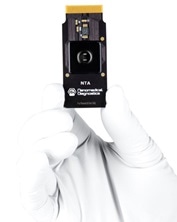Jul 26 2017
Nanomedical Diagnostics, a cutting-edge life science company pioneering graphene biosensors that accelerate pharmaceutical and biotherapeutics development, announces the launch of a new NTA biosensor chip for use with its label-free Agile R100 assay system. The new biosensor chip enables researchers to study the kinetics of polyhistidine-tagged (His-tagged) molecules quickly and reliably.

Agile R100 NTA Biosensor Chip
“Recombinant proteins are an essential part of many drug discovery programs, and they are often expressed with His-tags,” says Nanomedical Diagnostics CEO, Ross Bundy. “Prior methods for characterizing proteins involve many steps that make the process long, prone to error, and require specialist expertise. The new NTA Biosensor Chip combined with the breakthrough Agile R100 personal assay system decreases the steps needed to gather label-free kinetic binding data, which reduces variability and time to results. It simplifies the workflow so that anyone who can run an ELISA can run an Agile R100 assay with an NTA biosensor, which makes this information-rich, reliable data accessible to all researchers.”
Nitrilotriacetic acid (NTA) is pre-functionalized on the biosensor surface, enabling fast immobilization of His-tagged molecules. Each chip can provide up to 10 measurements, enabling an entire dose-response curve or replicate data to be run on one chip. Researchers can control the orientation of His-tagged proteins on the sensor surface and easily release them for chip reuse using standard NTA release protocol. Agile R100’s single-sample format brings the sample directly to the sensor surface, which means data can be gathered using a miniscule amount of material. This reduces the amount of protein synthesis required, increasing cost-efficiency. Agile R100 NTA biosensors can detect directly in complex solutions such as DMSO, cell and tissue lysate, and cell growth supernatant, drastically reducing sample prep time.
“The personal assay system Agile R100 lets scientists characterize compounds easily and affordably,” continues Mr. Bundy. “All Agile biosensors can sense in complex solutions with just a 10 µL drop of sample, and the launch of the NTA biosensor now provides additional chemistry options. We’re continuing to introduce new biosensors to bring label-free kinetic binding data to the benchtop of every researcher who would like to save time, cost, and resources in the drug discovery process.”